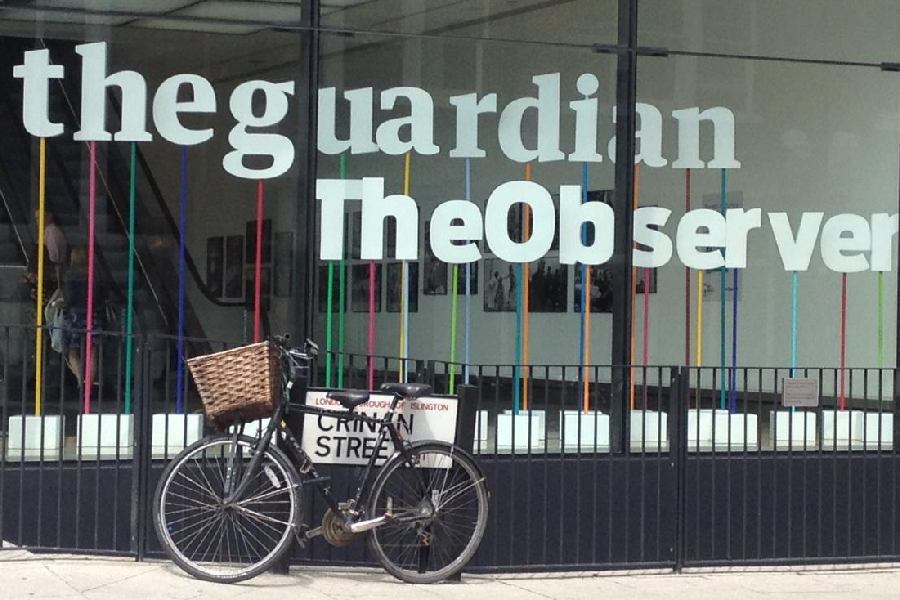It is the kind of historical artefact that would be easy to miss: an old and fragile little book unearthed in the archives of the Derbyshire Record Office, in the East Midlands of England. The book, a commercial ledger from 1822, holds the names of enslavers who ran cotton plantations on islands along the coast of Florida, Georgia and South Carolina.
And on one of the browning pages, in elegant, handwritten script, someone has inked the name of the company buying that cotton: Shuttleworth, Taylor & Co.
Cassandra Gooptar, a post-doctoral research fellow at the University of Hull, knew that firm and had been hunting for any trace of it for five months. The Taylor in question was none other than John Edward Taylor, founder of The Manchester Guardian, now known simply as The Guardian, the most prominent progressive newspaper in Britain for more than two centuries.
“At that moment, what I realised is that we can now connect the founder of The Guardian to the enslaved people of the Sea Islands,” Gooptar said in a recent call from Trinidad, where she grew up. “It proved that he was importing cotton, picked by slaves, for profits.”
Gooptar’s efforts were commissioned by The Guardian itself, and her findings were the foundation of a sombre series, “Cotton Capital: How Slavery Changed the Guardian, Britain and the World.” The project included video essays by historians, portraits by leading Black artists, a podcast and a newsletter.
The project also looked beyond Taylor and into the original investors of the newspaper, nine of whom, research revealed, profited from the slavery economy. There were also deep dives into the history of the people who were enslaved.
“We were originally told by historians that it was unlikely we’d learn a lot of details about the plantations themselves, aside from a broad sense of the geographic area,” said Maya Wolfe-Robinson, the editor of Cotton Capital. “Then these links to the Sea Islands and a plantation in Jamaica were discovered, and at that point, we realised there was an opportunity to use all our journalistic tools.”
The Guardian rummaged around its archives and found that the paper, while staunchly abolitionist, had published editorials sympathetic to enslavers. It supported, for instance, government payouts to slave owners as compensation for lost “property”.
The project is one of the most thorough and public of the reckonings underway as Britain begins the halting, occasionally criticised and, many say, the long overdue process of confronting the gruesome history of slavery in its past.
For decades, Britons have focused with understandable pride on the pioneering role the country played in stamping out slavery, most notably when Parliament passed the Slavery Abolition Act in 1833. Almost entirely missing from conversations and curriculums, however, are the spectacular sums that poured into Britain through slavery for roughly 200 years.
“Britain constructed, very successfully, a narrative in the 19th century, which became dominant for 150 years,” said Nicholas Draper, a historian and a co-author of Legacies of British Slave-Ownership. “We say that slavery was a terrible thing, but we were responsive to it, we did away with it and we expunged that stain from the British nation.”
The US is still grappling with its own account of slavery, a story that lurks behind bitter and highly polarised debates over affirmative action, police brutality, wealth inequality, and even which books are stocked in high school libraries. What isn’t up for serious discussion is that a huge number of Americans benefited from enslaving other Americans.
By contrast, academics say, many Britons have learned only recently how many town fathers and aristocrats got rich from slavery. Though it came late to the trade, and initially trailed rivals Spain and Portugal, by the 18th century the country was the biggest shipper of captive Africans in the world.
Those facts weren’t much discussed until the murder of George Floyd, in May 2020, and the global spread of the Black Lives Matter movement. A number of British corporations soon issued public apologies for their connections to the slave trade. A pub chain, Greene King, revealed that its founder, Benjamin Greene, had been given the equivalent of about 500,000 pounds, or $633,000, in today’s money by the British government after the abolition of slavery, to compensate him for losses incurred when he gave up plantations in the West Indies.
“It’s inexcusable that one of our founders profited from slavery and argued against its abolition in the 1800s,” Nick Mackenzie, the Greene King’s chief executive, said in an article in The Telegraph.
That same month, the Bank of England apologised for the “inexcusable connections” involving its former governors and directors to slavery. Lloyd’s of London, the insurance giant, apologised for selling coverage to participants in the slave trade. The company said in a statement, “This was an appalling and shameful period of British history, as well as our own.”
The cascade of apologies was followed by a backlash. It seemed to reach maximum decibel levels in September 2020 when the National Trust, the country’s conservation society, published a list of 93 of its properties with links to slavery and colonialism, including the country home of Winston Churchill.
New York Times News Service











